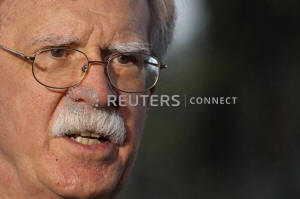|
Exclusive: Trump eyeing stepped-up
Venezuela sanctions for foreign companies - Bolton
 Send a link to a friend
Send a link to a friend
 [March 30, 2019]
By Steve Holland and Roberta Rampton [March 30, 2019]
By Steve Holland and Roberta Rampton
WASHINGTON (Reuters) - U.S. President
Donald Trump is considering imposing sanctions on companies from other
countries that do business with Venezuela to cut off revenues to
President Nicolas Maduro, Trump's national security adviser John Bolton
told Reuters TV on Friday.
"We're moving exactly in that direction," Bolton said when asked whether
Trump would consider what are known as "secondary sanctions."
"We are even now looking at a series of additional steps we could take,"
Bolton said in the interview.
The United States and most other Western countries have thrown their
backing behind Venezuelan opposition leader Juan Guaido, who invoked the
constitution in January to declare himself interim president, arguing
that Maduro's 2018 re-election was illegitimate.
Oil provides 90 percent of export revenue for OPEC member Venezuela. The
United States imposed sanctions on Venezuela's state-owned oil company
PDVSA in January, preventing U.S. companies from dealing with it unless
revenues went to a fund available to Guaido.

The Trump administration has not yet slapped sanctions on companies from
other countries that do business with PDVSA - but U.S. officials have
been having "conversations" with oil trading houses and governments
around the world to convince them to scale down their dealings with
Maduro, Trump's Venezuela envoy Elliott Abrams said earlier on Friday.
MONROE DOCTRINE
Russia and China support Maduro, who has said Guaido is a puppet of
Washington. Maduro retains control of state functions and the loyalty of
the country's military.
Bolton said he was not concerned that the push to oust Maduro was losing
momentum.
"I can tell you there's a lot going on beneath the surface. The
opposition is in constant contact with large numbers of admirals and
other supporters within the Maduro administration," Bolton said.
"It's a struggle against an authoritarian government and it's obviously
going to take some time," he said.
[to top of second column]
|

U.S. National Security Advisor John Bolton speaks during an
interview at the White House in Washington, U.S., March 29, 2019.
REUTERS/Brendan McDermid

Trump is looking at options - including sanctions - to respond to
Russia's growing military presence in Venezuela, Bolton said. Two
Russian air force planes carrying nearly 100 military personnel
landed outside Caracas on Saturday.
"We're not afraid to use the phrase 'Monroe Doctrine' in this
administration," Bolton said, referring to the 1823 policy
established by then-President James Monroe, widely seen in Latin
America as a justification for U.S. armed intervention in the
region.
"And one of the purposes of the Monroe Doctrine was to prevent
foreign interference and even recolonization," Bolton said.
"If you look at the presence of Cuban and Russian forces in
Venezuela, you have to ask when will the people of Venezuela get to
choose their government rather than foreigners?" he said.
Venezuela's economic crisis, which has caused shortages of food and
medicine, has pushed millions of people to flee the country.
Trump is considering granting temporary protection from deportation
to the more than 70,000 Venezuelans believed to be in the United
States, but wants to focus first on ensuring there is a transition
in the government of the country, Bolton said.
"We want to be sure that people are not put back into a difficult
position if they're opponents of the Maduro regime. On the other
hand, there are many families of Maduro regime supporters in this
country that wanted out of Venezuela to be safe," Bolton said.
(Reporting by Steve Holland and Roberta Rampton, Editing by Rosalba
O'Brien and Tom Brown)
[© 2019 Thomson Reuters. All rights
reserved.]
Copyright 2019 Reuters. All rights reserved. This material may not be published,
broadcast, rewritten or redistributed.
Thompson Reuters is solely responsible for this content.
 |